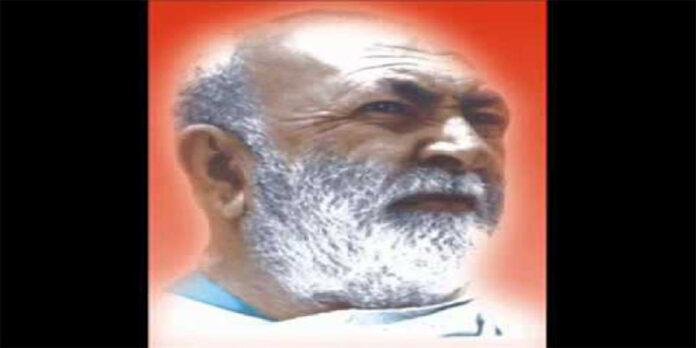Eminent African leader Nelson Mandela said, “ I learned that courage was not the absence of fear, but the triumph over it. The brave man is not he who doesn’t feel afraid, but he who conquers that fear.”
Samad Khan Achakzai (known as Khan Shaheed) was one of the practitioners of the principle.
Today (2nd of December) is the 48th death anniversary of Abdul Samad Khan Achakzai, the man who advocated democracy, struggled for constitutional supremacy, conceptualized politics among Pashtuns, and placed the foundation of modern Pashtun nationalism in 20th century.
Samad Khan Achakzai was among the frontmen of the freedom movement against the British colonial Raj in the Indian subcontinent.
Tracing family background, Samad Khan was born on July 7, 1907 in Gulistan Karez, Qilla Abdullah Khan, a Pashtun-majority district in the North West of Balochistan. His forefathers were the companions of Ahmad Shah Abdali during the third great war of Panipath in 1761.
Samad Khan Achakzai spent half his life (almost 33 years) in imprisonment for advocating constitutional rights, equal political representation, geographical and ethnic identity, control over resources, and democratic reforms.
He was martyred along the way on December 2, 1973, when the unknown killers lobbed two hand grenades into his house in Quetta. His assassination put a clear question mark on the government of Z.A. Bhutto, and his nationalist allies who were known as Achakzai’s opponents.
Among the political elite, Samad Khan Achakzai was probably the only leader who spent General Ayub Khan’s entire martial law period in prison.
The annexation of Pashtuns of Balochistan with the then NWFP, and naming it Pashtunistan province were among the principal demands for which Samad Khan Achakzai quested and sacrificed his life.
Unfortunately, people have been intentionally misled into believing that the Pashtunistan movement that the Pashtuns of Pakistan have started, has something to do with Afghanistan, meaning that it aims to bring the Pashtuns under Afghanistan.
Additionally, it was also said that Pashtunistan means the establishment of an independent and autonomous state which is categorically fallacious and futile in its nature.
In his book “ Court Statements of Samad Khan Achakzai, Shaukat writes that in 1943, Muslim League leaders including Muhammad Hashim Khan Ghalzai, Mir Jafar Khan, and Abdul Ghafoor Khan Durrani came to meet Samad khan on the issue of bringing political reforms in Balochistan, and asked him to propose suggestions for Balochistan.
Achakzai demonstrably told that no political reform in Balochistan can be useful without its division on an ethnic basis. This message was also conveyed to Muhammad Ali Jinnah. Later, these people told him that Mr. Jinnah also agreed with the proposal.
To add more, when the government of Pakistan set up a committee for constitutional reforms in Balochistan under the leadership of Dr. Mahmood Hussain in 1951-52, the Committee sent a questionnaire to Samad Khan Achakzai officially when he was incarcerated in Haripur Jail.
His ultimate answer was the partition of Balochistan to annex Pashtuns with NWFP (now Khyber Pakhtunkhwa). Some Pakistani political elite believed that it was Abdul Wali Khan who was unwilling to merge Balochistan’s Pashtuns with the NWFP.
It is vividly clear that what Samad Khan actually meant by Pashtunistan?. Constitutionally sovereign province of Pashtuns within the geography of Pakistan, a demand for which Samad khan fought till the last day.
Pathetically, the powerful establishment and its mouthpieces have always misled the majority of Pakistanis on genuine political issues. History and facts have always been shown in a way that does not jeopardize their interests, and have always misrepresented their opponents. The continuity of this sort of policy will surely bring Pakistan to the brink of national disintegration, political chaos, insecurity, and failure.
Undoubtedly, it has also been the policy of Pakistani stakeholders to blame opponents for anti-state agendas, and award certificates of treason.
In the last week of October 1955, the Government of Pakistan announced conducting elections under One Unit Scheme to counterbalance the domination of East Pakistan.
Samad Khan, along with others, campaigned and criticised the One Unit, and the pattern of conducting elections in Balochistan under Jigra Members.
He called it a decision to usurp the rights of the subjugated ethnicities. Following his speech in district Loralai, Samad Khan was arrested, and imprisoned for a month. On November 1, 1955, West Pakistan issued a detention order for another six months.
Following Achakzai’s arrest, then Chief Minister of West Pakistan, Dr. Khan Sahib held a press conference in Karachi and claimed that Samad Khan Achakzai in his speech, has waved and saluted to the flag of a hostile state.
He promised to present the evidence in Court. On the day of appearance before the Court, Dr. Khan Sahib neither appeared nor any evidence was presented. Later on, Achakzai’s friends challenged his unlawful detention in Karachi High Court, and he was released after three months of imprisonment.
The misuse of law and authority to oppress opponents is the worst kind of practice of establishment and ruling elite. These policies must come to a complete end. And it’s high time to learn and practice what is necessary for the state.
Samad Khan’s political philosophy “struggle for just rights in a democratic way” could provide an effective track for political stability. Since 1947, Pakistan has been facing political instabilities, controversies over the division of resources among the provinces, and ethnic disintegration.
Pakistan must learn from history if it wants to move forward. Blaming and Blackmailing will give nothing to the state. The supremacy of the Constitution, sovereign parliament, rule of law, ensuring rights to all ethnic groups, and non-involvement of establishment in politics are the prerequisites of political stability and national integrity.





Well done sir, learned alot from this.
Well done sir, learned alot here.